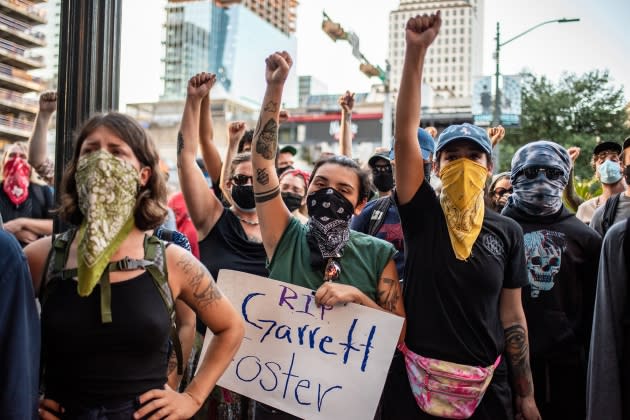Daniel Perry Sentenced to 25 Years in Prison for Murder of BLM Protester
- Oops!Something went wrong.Please try again later.

On Wednesday, a judge sentenced Daniel Perry to 25 years in prison for the murder of Black Lives Matter protester Garrett Foster. However, it is unclear how much time Perry will serve, as Texas Governor Greg Abbott has promised he will pardon Perry if the Texas Board of Pardons and Paroles send him a request.
On Tuesday’s first day of the sentencing hearing, the prosecution asked District Judge Clifford Brown to give Perry a minimum of 25 years in prison, saying he was a “loaded gun” who had the potential to harm people again, according to reporting by the Austin American-Statesman. Perry’s defense team had requested 10 years, saying that Perry, an Army veteran, was not the violent racist prosecutors made him out to be. A forensic psychologist hired by the defense testified that after an eight-hour examination, he had determined that Perry was autistic and had PTSD.
More from Rolling Stone
Mom Accused of Husband's Overdose Murder Asked Dealer for 'the Michael Jackson Stuff'
A Menudo Boy Bander's Disturbing Link to the Menendez Brothers
Ryan Murphy Sets Sights on Menéndez Brothers for 'Monster' Season 2
In April, an Austin jury found Perry, a 35-year-old U.S. Army Sergeant and Uber driver, guilty of murder in the death of Foster, an Air Force veteran who was 28 when he died. Perry, who was legally carrying a handgun in his car, shot Foster, who was legally open-carrying an automatic rifle on his chest, after he pulled his car onto a street filled with protestors in the summer of 2020. After the verdict, an outcry in support of self-defense laws rose from the political right, and Texas’ Republican Governor Greg Abbott vowed to pardon Perry.
The case fed an ongoing, polarizing discourse about the Second Amendment and self-defense laws. Many conservatives rallied around Perry on the same basis they’d embraced Kyle Rittenhouse, who in 2021 was acquitted of murdering two BLM protesters in Wisconsin: they believed self-defense laws justified his actions. Rittenhouse himself went on Tucker Carlson’s show to voice his support for Perry. Within days of the verdict, Abbott announced that he would pardon Perry. “Texas has one of the strongest Stand Your Ground laws of self-defense,” he said in a statement that he tweeted out, “that cannot be nullified by a jury or a progressive district attorney.”
Prosecutors denied the self-defense argument, saying Perry could not control his anger. They presented evidence to jurors showing Perry had talked about killing protesters before he did it. “I might have to kill a few people on my way to work, they are rioting outside my apartment complex,” he wrote to a friend the month before the shooting. On another occasion he said, “I might go to Dallas to shoot looters.” In DMs, a fellow gun owner warned him: “We went through the same training,” he said. “Shooting after creating an event where you have to shoot, is not a good shoot.” Court records unsealed after the verdict also showed Perry had posted on social media about wanting to harm Muslims and Black people.
Foster’s death occurred during a summer when unrest roiled the nation, as people took to the streets nightly protesting the police murder of George Floyd. According to Foster’s longtime partner, Whitney Mitchell (who considers herself his wife), who spoke with Rolling Stone last month, she and Foster had been out regularly that summer, standing up for racial and social justice. “Seeing this go on for years, me and Garrett had had multiple conversations about it,” she told RS, referring to police brutality. “We decided to go out and be out there and voice our concerns.”
On July 25, 2020, Mitchell and Foster were out marching near Austin’s capitol when Perry ran a red light, turned a corner, and drove into the middle of a group of protesters, according to police and evidence presented during the trial. In testimony at Perry’s two-week trial, witnesses disagreed about how fast Perry was going and whether he intentionally drove into the protest or not. He claimed he’d made a wrong turn. After he came to a stop, some protesters slapped and kicked the car in frustration, witnesses testified. Foster approached the driver’s side door and issued a directive. “I remember Garrett saying, ‘Move on,’” Mitchell said on the stand. Foster was openly carrying an AK-47 across his chest, which is legal in Texas. Perry then fired five shots from a handgun through his driver’s side window, killing Foster, before driving away. “All I remember is hearing gunshots, and Garrett just falling over in front of me,” Mitchell testified.
Perry told police Foster had raised the barrel of his rifle and pointed it at him. “I thought he was going to kill me,” he told police officers on body camera footage of him being taken into custody. Witnesses refuted Perry’s claim that Foster had raised the gun. “He did not have to engage with the protesters, Garrett Foster, or anybody else,” During closing arguments, prosecutor Elizabeth Lawson said that Perry had intentionally engaged with the protestors. “You cannot shoot and kill someone for walking up to you while exercising the right to open carry,” she said.
When Mitchell spoke with Rolling Stone, she said that Abbott’s plan to pardon Perry had re-opened wounds that had barely begun to heal with the guilty verdict. “To go through everything that we’ve been through and now to hear what’s happening, it’s just horrible,” she told RS. “It’s like, when you get to a feeling of being relieved, then it’s all taken away.”
Best of Rolling Stone
